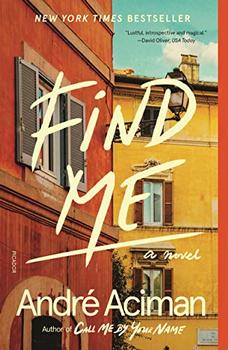Book Club Discussion Questions
In a book club? Subscribe to our Book Club Newsletter and get our best book club books of 2025!
For supplemental discussion material see our Beyond the Book article, Literary Sequels and our BookBrowse Review of Find Me.
Please be aware that this discussion guide will contain spoilers!
- The book begins with a conversation between Miranda and Samuel, who are strangers. What is
your first impression of them? What are the similarities and differences in attitudes, beliefs, and
experiences that draw them to each other? What are the critical moments in the development of
their relationship? Why might Aciman have chosen this opening, given that the story ultimately
belongs to Elio and Oliver?
- Who is the "Me" of the book's title? Might there be more than one? What does it mean to be
found? How are the themes of love, loss, and loneliness explored in each section?
- Miranda's father is editing a dissertation that contains parables, which he says prove that "life
and time are not in sync" and that we all "have many lives." How is each character's story a
parable about how time and life are not in sync? How does each have many lives?
- What is a vigil? What are the vigils that Samuel and Elio are looking forward to in Rome? How
does Miranda's presence affect their experience? Are there other significant vigils in the book?
- How are Elio and Michel, in the early stages of their love affair, like Samuel and Miranda? What
vigils do they establish? What are the differences between the two couples?
- When Michel asks his father, Adrien, who Léon was, his father replies, "You're making me remember,
and I don't want to remember." What is the significance of the story of Adrien and Léon
and the musical score, the cadenza, that Adrien leaves to his son? Is there a message hidden in
Léon's work? Why is Elio determined to help Michel discover who Léon was and how he died?
In the end, does Michel find out what his father didn't want to remember?
- What is a canard? Why is it the word Michel chooses to describe Oliver's marriage? Is it meant
to be ironic? Are there other canards in the characters' lives?
- The story of Elio and Oliver is revealed gradually. What do we learn about them in each section?
How did Elio's experience of first love as a boy shape the man he has become? What do we know
of Oliver's life in the years after he left Elio in Italy? What does Oliver's infatuation with Erica
and Paul tell us about him? What happens in the time between the events of "Capriccio" and "Da
Capo"?
- How are the different stages of life—youth, middle age, and old age—depicted? How does a character's
age influence his or her beliefs about life, love, and death? Why does Miranda tell Samuel
that "none of it would have happened if you were thirty years old?" How does Michel describe
the differences between his younger and older selves?
- Samuel and Miranda, and Elio and Michel, meet entirely by chance. In the relationships thatzdevelop
between each couple, as well as Oliver's fantasy relationship with Erica and Paul, what
are the moments, words, or gestures that suggest the possibility of deeper connections? What are
real or imagined impediments?
- Which of the characters believe in the power of fate to alter the course of a life? How does fate
or chance impact each of them? How do the lyrics of the Brazilian song that Elio translates
for Michel resonate throughout the book?
- Does Elio fall in love with Michel? Has Oliver ever loved anyone except Elio? Why does
love come so easily to Samuel and Miranda? In general, what lessons does the book teach
us about love? To whom is it available? What sacrifices does it require?
- Miranda's father says, "I want those who outlive me to extend my life, not just to remember it."
Michel tells Elio, "Nothing belongs to the past." How are past and present intertwined and what
are the consequences? By the end of the book, how have the lives of the deceased been extended
into the present? Why does Elio feel that his half brother is his and Oliver's child, and that his
father "knew it just as well, had known it all along?"
- What is the significance of each section title? For example, "Tempo," the title of the first section, is
a musical term meaning the speed at which a passage of music is or should be played. It is also the
Italian word for time. How do both meanings resonate? What are the meanings of the other section
titles? How are the themes of time and music interrelated?
- Find Me is a romance, a tragicomic novel that spans generations, with themes of separation
and reunion, exile, and jealousy. What are the moments of tragedy in the book? Of comedy?
How else do the stories of Samuel and Miranda, Elio and Michel, and Elio and Oliver work
as romance? What are other stories of lovers reunited after years of separation?
Unless otherwise stated, this discussion guide is reprinted with the permission of Picador.
Any page references refer to a USA edition of the book, usually the trade paperback version, and may vary in other editions.
